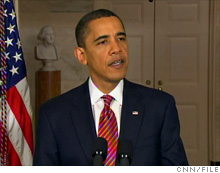Search News
NEW YORK (CNNMoney.com) -- President Obama pressed Wall Street bankers at the White House on Monday, urging them to make more loans and modify mortgages to help taxpayers who propped their banks up with federal bailouts.
"My main message in today's meeting was very simple: America's banks received extraordinary assistance from American taxpayers to rebuild their industry," Obama said. "Now that they're back on their feet, we expect an extraordinary commitment from them to help rebuild our economy."
 |
| President Obama talks to Wall Street bankers. |
However, a senior bank executive at the meeting had a slightly different take. He called the meeting uneventful and scripted, with no major disagreements.
"President Obama is doing his best and encouraged banks to 'lean forward' to move credit more robustly," the senior bank executive said.
Indeed, the president said he pressured the nation's top dozen bank chief executives to open up the lending spigots to help the economic recovery. He also said he'd urge them to curb compensation, and to stop gouging customers with high credit card rates and hidden overdraft fees.
However, when he met face-to-face with them, his tone was far more cordial than it was during in a Sunday interview with CBS' "60 Minutes," when he invoked the phrase "fat-cat bankers on Wall Street."
"The President did not give the speech he gave to '60 Minutes' to us," the bank executive said.
In his public statement after the meeting, Obama said he also took bankers to task for lobbying "vigorously" against parts of the financial legislation to reshape the regulatory system and prevent future financial crises.
"Short-term gains are of little value to our banks if they lead to long-term chaos in the economy," he said. "I made very clear that I have no intention of letting their lobbyists thwart reforms necessary to protect the American people."
The bank executive who attended the meeting said the president asked bankers to support financial regulatory reform, and everyone in the room appeared to agree with him.
Critics question the impact of such a meeting, since the federal government has lost its leverage over the banks that repaid bailout money -- $116 billion so far. Earlier today, Citigroup announced they struck a deal to repay their $20 billion TARP loan.
Policymakers have little power over bankers who have their own priorities, namely, making money.
The American Bankers Association released a background statement pointing out that the largest 21 bailed out banks had made $2.2 trillion in new loans since receiving TARP funds. They also blamed Washington for creating an unstable regulatory environment, which has stymied lending.
"Well-intentioned efforts to address problems can have the unintended consequence of making things worse," the banking lobbying group said in its report.
Several of the New York chief executives at the largest Wall Street banks didn't make an appearance in Washington, saying fog in Washington delayed their flights. Attending via teleconference were Goldman Sachs (GS, Fortune 500) Chief Executive Lloyd Blankfein, Morgan Stanley (MS, Fortune 500) Chief Executive John Mack, and Citigroup (C, Fortune 500) Chairman Dick Parsons.
Citigroup Chief Executive Vikram Pandit also skipped the meeting, citing his work negotiating Citgroup's repayment of of the federal bailout, said Citigroup spokesman Jon Diat.
"Mr. Pandit recognizes the extreme importance of today's meeting and regrets that he will be unable to attend due to today's announcement of Citigroup actions for repaying TARP," Diat said.
Bank chief executives who did attend in person were American Express (AXP, Fortune 500)' Ken Chenault, US Bancorp (USB, Fortune 500)'s Richard Davis, JP Morgan Chase (JPM, Fortune 500)'s Jamie Dimon, Capital One (COF, Fortune 500)'s Richard Fairbank, Bank Of New York Mellon's (BK, Fortune 500)'s Bob Kelly, Bank of America (BAC, Fortune 500)'s Ken Lewis, State Street Bank (STT, Fortune 500)'s Ron Logue, PNC (PNC, Fortune 500)'s Jim Rohr, and Wells Fargo (WFC, Fortune 500)'s John Stumpf.
The Financial Services Roundtable, a bank lobbying group, called the conversation with Obama "open and constructive."
"We share the President's goals of strengthening lending to all sectors of the economy, helping homeowners avoid foreclosure, aligning compensations practices with long-term risk horizons, and modernizing the regulatory framework," said group president Steve Bartlett.
- CNNMoney.com anchor Poppy Harlow contributed to this report. ![]()






| Index | Last | Change | % Change |
|---|---|---|---|
| Dow | 32,627.97 | -234.33 | -0.71% |
| Nasdaq | 13,215.24 | 99.07 | 0.76% |
| S&P 500 | 3,913.10 | -2.36 | -0.06% |
| Treasuries | 1.73 | 0.00 | 0.12% |
| Company | Price | Change | % Change |
|---|---|---|---|
| Ford Motor Co | 8.29 | 0.05 | 0.61% |
| Advanced Micro Devic... | 54.59 | 0.70 | 1.30% |
| Cisco Systems Inc | 47.49 | -2.44 | -4.89% |
| General Electric Co | 13.00 | -0.16 | -1.22% |
| Kraft Heinz Co | 27.84 | -2.20 | -7.32% |
|
Bankrupt toy retailer tells bankruptcy court it is looking at possibly reviving the Toys 'R' Us and Babies 'R' Us brands. More |
Land O'Lakes CEO Beth Ford charts her career path, from her first job to becoming the first openly gay CEO at a Fortune 500 company in an interview with CNN's Boss Files. More |
Honda and General Motors are creating a new generation of fully autonomous vehicles. More |
In 1998, Ntsiki Biyela won a scholarship to study wine making. Now she's about to launch her own brand. More |
Whether you hedge inflation or look for a return that outpaces inflation, here's how to prepare. More |